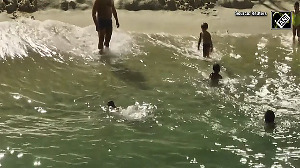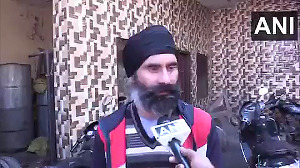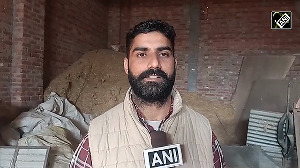Their qualification for a tournament ranking them among the best 16 teams in Europe is nothing short of a sporting miracle achieved against all the odds.
But now the Latvians have reached their first major finals they are looking to do more than just make up the numbers.
"This is the greatest achievement in Latvian football history, and the result of years of hard work," Football Federation President Guntis Indriksons told state TV after they eliminated Turkey in the shock result of Wednesday's playoffs.
Crowds shouted "Maris" in honour of striker Maris Verpakovskis, who scored Latvia's second goal in Istanbul to give them a 2-2 draw on the night and a stunning 3-2 win on aggregate.
He also scored the goal that secured the playoff place with a 1-0 victory away to Sweden in their final group game last month and ended the qualifying competition with six goals.
The overall victory against Turkey -- World Cup semi-finalists just 17 months ago -- was remarkable for a country with a population of just 3.2 million people.
But the team, largely made up of semi-pro and amateur players, had of course already made their mark in the group stages with their surprise win in Sweden to deprive Poland of the chance to finish second in the qualifying group.
Instead, Sweden finished top, Latvia went into the playoffs as runners-up and Poland were eliminated.
Latvia started their long journey to Portugal with a 0-0 draw against the Swedes in September last year but then went on to gain a confidence-boosting 1-0 win in Poland the next month.
They struggled to beat tiny San Marino 1-0 a year ago, winning only through an own goal, but the points proved more important than the performance.
A 3-0 victory over San Marino in April meant they had 10 points from a possible 12 at the halfway stage. People started to believe that reaching the finals was a possibility.
NATIONAL HERO
Coach Aleksandrs Starkovs stuck to a formula of dogged defending and swift counter-attacks that saw the rise of quick-footed striker Verpakovskis -- now a national hero.
His emergence was vital as Latvia were denied the services of their most talented player, Marian Pahars of English premier league club Southampton. He was out for more than a year with a series of injuries and has only just returned to fitness.
Although Latvia then lost two successive matches against Hungary (1-3) and Poland (0-2), wins in their last matches against Hungary (3-1) and Sweden (1-0) saw them into the playoffs.
Now they have reached the finals, Vaiders is keeping his feet firmly on the ground.
"It's very difficult to say how the team will do," he said of Latvia's chances in Portugal, citing a total lack of experience in playing in a major tournament.
"But since we've been the underdogs in every match apart from those against San Marino, I'd say there is always a chance."
Whatever happens next summer, Latvia are very much back on the soccer map.
They played as an independent country between 1922 and 1940 almost exclusively against their Baltic neighbours Estonia and Lithuania and nearby Finland and Sweden.
Their autonomy ended when they became part of the Soviet Union in 1940 and they only began playing as Latvia again in 1991 after the collapse of the Soviet Union.
They will be the only team at the finals never to have appeared before -- and that more than anything represents a considerable achievement in a country where ice hockey is king, and soccer, until now, has taken second place.








 © 2025
© 2025